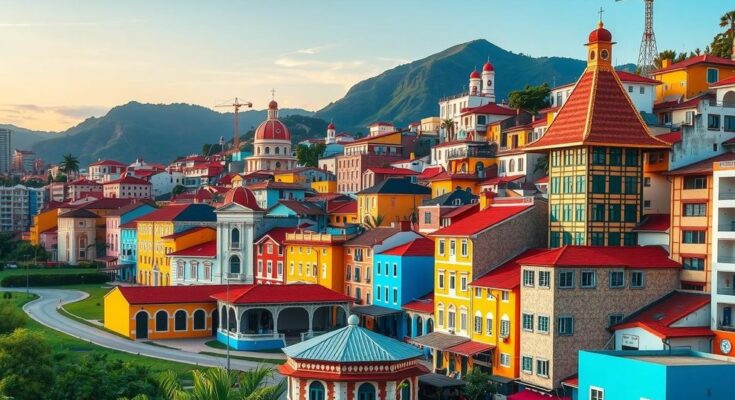Jhoan Bastidas, a Venezuelan deported from the U.S. after 16 days in Guantanamo Bay, reflects on the challenges he faces upon returning to a struggling Maracaibo. His imprisonment, linked to wrongful gang allegations due to tattoos, underscores the impacts of strict immigration policies under Trump. Bastidas advocates for resilience and faith as he rebuilds his life, which parallels the experiences of over 350 deported Venezuelans.
Jhoan Bastidas, a Venezuelan who experienced a difficult journey, was deported from the United States after spending 16 days at Guantanamo Bay. There, he faced solitude in a small room, subsisting on inadequate meals. Now, back in Maracaibo, Venezuela, he reflects on how tattoos on his body led to his mislabeling as a criminal and how he navigates his return to the country he left as a youth, under the backdrop of President Trump’s immigration policies.
Bastidas is among roughly 350 Venezuelan deportees attempting to rebuild their lives following their return to Venezuela, each facing the challenges brought on by their deportation. Their journey included time at Guantanamo Bay before being returned to Venezuela on flights organized by American authorities. The Trump administration’s claim that these deportees were gang members remains unsubstantiated, leading many, like Bastidas, to question their categorizations.
The crisis in Venezuela has led to millions leaving their homeland. Since 2013, over 7.7 million individuals have fled due to the country’s deteriorating economic conditions. Bastidas’s family, escaping the dire situation, moved from Venezuela to Colombia and later sought a better life in the United States, highlighting the desperation that many Venezuelans face.
Bastidas’s journey to the United States began with hopes for employment in Utah. After contacting U.S. authorities upon reaching the border, he was inadvertently sent to Guantanamo Bay instead of being granted asylum, a turn of events that drastically altered his path.
During his time in Guantanamo Bay, Bastidas experienced isolation, being locked in a small cell with limited contact with the outside world. He described his imprisonment as an ordeal that involved shackling every time he left his cell. Despite the bleak circumstances, he found solace in shared prayer with fellow detainees, hoping for divine intervention.
Under the Trump administration, deportations increased significantly, and Bastidas’s experience reflects the broader implications of this policy. Misinterpretations regarding his tattoos led to his wrongful classification as associated with a gang, a notion he firmly denies. Such allegations have prompted legal action from organizations like the ACLU, which seeks to challenge the treatment of detainees at Guantanamo.
Now resettled back in his hometown, Bastidas contends with the realities of Maracaibo’s decline, a once-thriving area now dotted with abandoned properties. Despite facing peer judgments regarding his past, he utilizes faith as a means to cope with his experiences and is actively seeking to rebuild his life, including working at a local hot dog stand.
Bastidas views his trials as moments of resilience, stating that he believes his journey holds greater significance beyond his immediate struggles. He expresses faith in a higher purpose guiding his life, suggesting a commitment to either improving his community or searching for better opportunities elsewhere.
Jhoan Bastidas’s experience illustrates the complex challenges faced by deportees from the United States, particularly Venezuelans navigating the aftermath of political and economic strife. His journey from Guantanamo Bay back to Maracaibo is emblematic of the struggles resulting from mischaracterizations and governmental policies. As he seeks to reintegrate into his community, his reliance on faith and resilience serves as a testament to the human spirit’s endurance amid adversity.
Original Source: www.clickorlando.com




